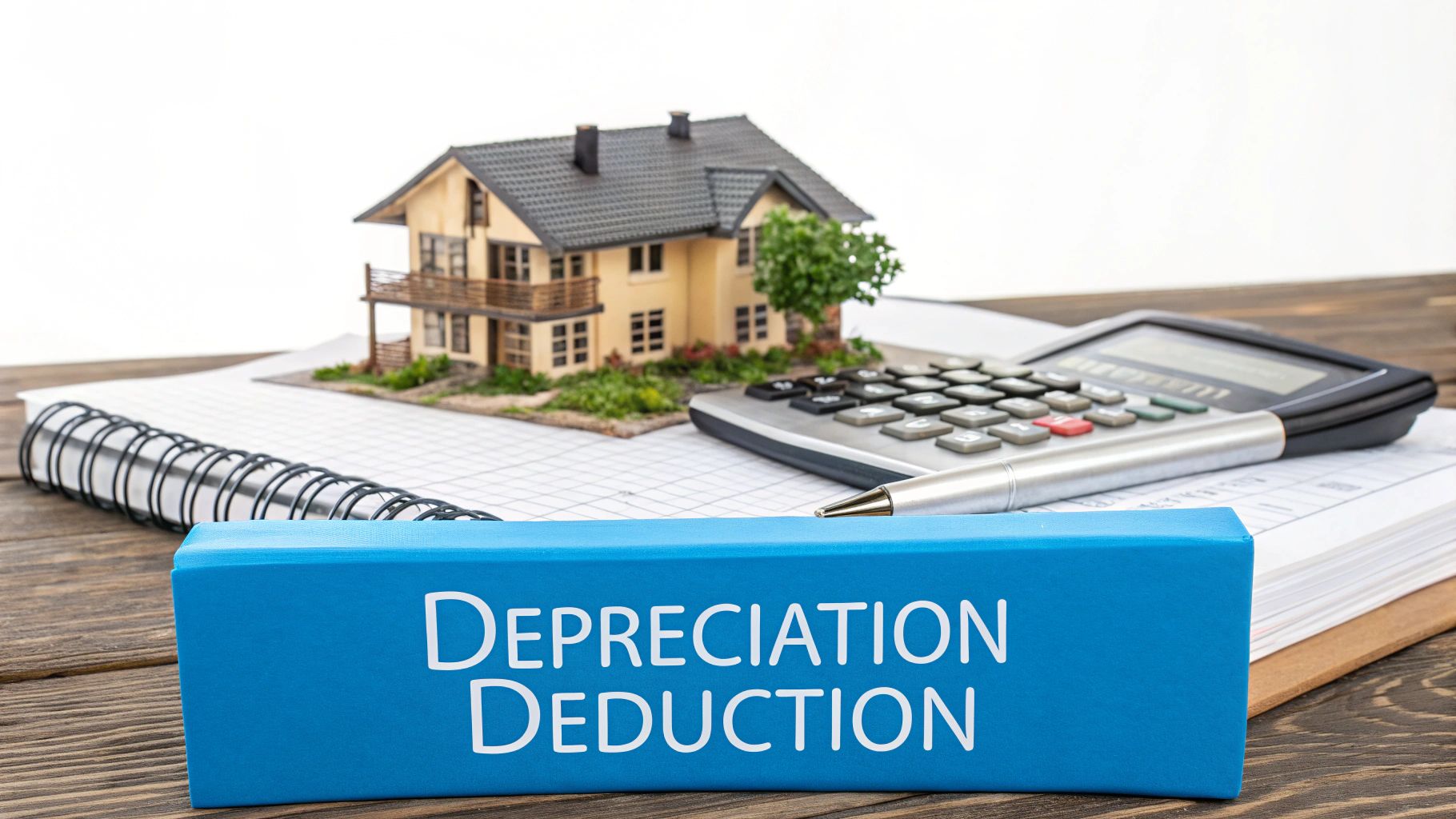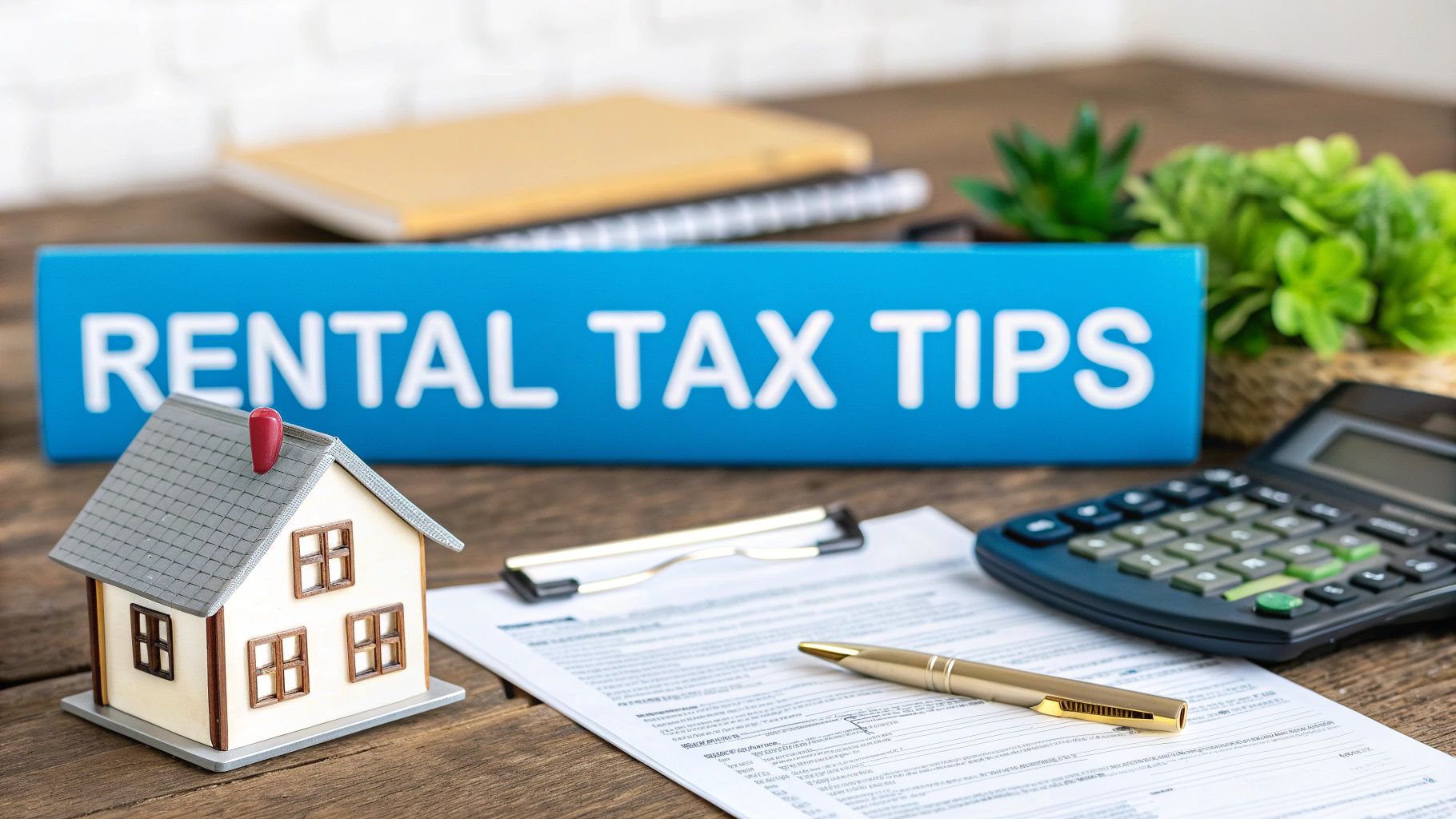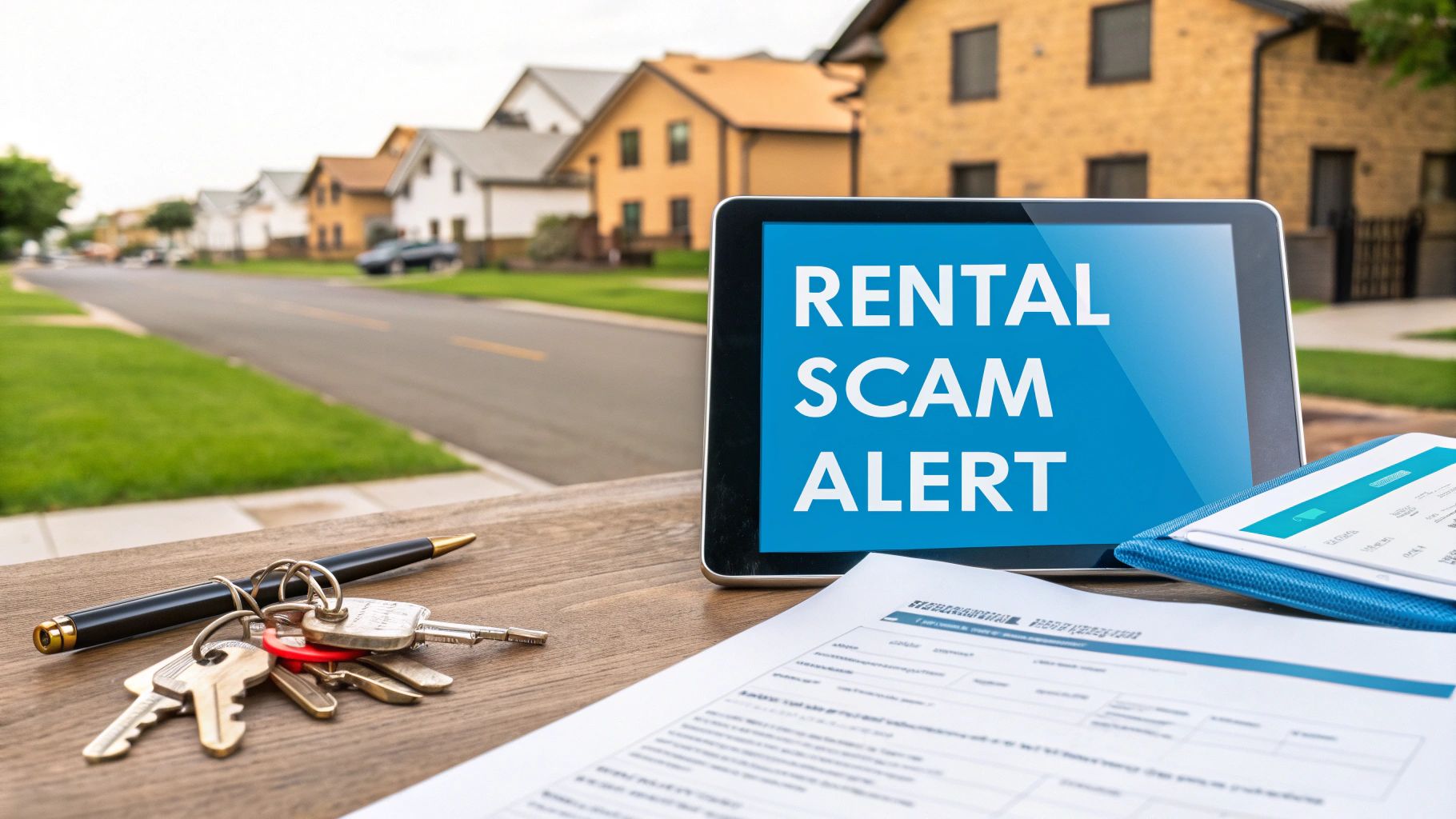Unlocking Tax Savings for Rental Property Owners
Owning rental properties can be lucrative, but maximizing your profits requires a keen understanding of allowable tax deductions. This listicle provides a comprehensive guide to eight key rental property tax deductions, empowering you to legally minimize your tax liability and enhance your return on investment. We'll explore practical strategies for documentation and claims, offering specific, actionable insights to help you keep more of your rental income.
Successfully navigating rental property finances often involves diligently tracking income and expenses. For additional tools and resources to monitor your financial progress, explore resources like net worth tracker apps highlighted in the Top Net Worth Tracker App Picks for 2025 from PopaDex.
This guide focuses on maximizing tax benefits through strategic deductions. By understanding and correctly applying these deductions, you can significantly impact your overall profitability.
Key Tax Deductions Covered:
- Depreciation: Learn how to deduct the cost of your property over time.
- Repairs & Maintenance: Understand the difference between repairs and improvements and how each impacts your tax liability.
- Mortgage Interest & Loan Fees: Discover deductible loan-related expenses.
- Property Management & Professional Services: Explore deductions for hired services.
- Insurance Premiums: Deduct premiums paid for various types of insurance coverage.
- Travel & Transportation: Learn about deductible travel related to your rental properties.
- Home Office Deduction: Explore setting up a dedicated home office for rental activities.
- Utilities & Operating Expenses: Discover deductible everyday expenses.
This in-depth guide equips single-family property managers, property management companies, and large rental portfolio owners with the knowledge to optimize their tax strategies. We'll cover each of these rental property tax deductions in detail, providing practical examples and actionable advice.
1. Depreciation Deduction
One of the most significant tax advantages for rental property owners is the depreciation deduction. This deduction allows you to recover the cost of your property over time, acknowledging that buildings wear out and become obsolete. This is a powerful tool for reducing your tax burden, even if your property's market value is appreciating. Essentially, the IRS allows you to deduct a portion of your property's cost each year as an expense, sheltering some of your rental income from taxation.

Residential rental properties are depreciated over 27.5 years, while commercial properties have a depreciation period of 39 years. This means you can claim a portion of your property's value as a deduction annually for the specified period. When diving into rental property tax deductions, it's crucial to know What Deductions Can Rental Property Owners Claim?. This resource from Nanak Accountants and Associates provides a comprehensive overview of deductible expenses, including depreciation.
Calculating and Maximizing Depreciation
Calculating depreciation involves dividing the property's cost basis (excluding the land value) by the appropriate depreciation period (27.5 or 39 years). For instance, a $275,000 rental property (excluding land) would generate an annual depreciation deduction of $10,000. This could translate to substantial tax savings. An investor in the 24% tax bracket would save $2,400 annually due to this deduction alone.
Examples of Depreciation in Action
- Scenario 1: A property purchased for $400,000 with a land value of $100,000 allows for $300,000 in building depreciation, significantly impacting the owner's taxable income over the depreciation period.
- Scenario 2: An investor with multiple properties can leverage depreciation across their portfolio to strategically minimize their overall tax liability.
Tips for Utilizing Depreciation Effectively
- Obtain a Professional Appraisal: Accurately separating land value from building value is critical. A professional appraisal ensures proper allocation and maximizes your depreciation deduction.
- Consider a Cost Segregation Study: Especially relevant for commercial properties, a cost segregation study can identify building components with shorter depreciation lives, allowing you to accelerate depreciation and realize greater tax benefits sooner.
- Maintain Detailed Records: Keep meticulous records of all improvements and renovations. These adjustments affect your depreciation calculations and are crucial for accurate reporting.
- Understand Depreciation Recapture: Be aware of the depreciation recapture rules before selling your property. Recapture may require you to pay taxes on previously claimed depreciation.
Depreciation is a crucial element of successful rental property ownership. By understanding how depreciation works and employing these strategies, you can significantly reduce your tax liability and improve your overall investment returns. This deduction is a powerful tool for maximizing profitability in the long run.
2. Repairs and Maintenance Deductions
One of the most frequently overlooked rental property tax deductions is the deduction for repairs and maintenance. This deduction allows you to offset the costs of keeping your property in good operating condition against your rental income. Understanding the difference between repairs and improvements is crucial for maximizing this deduction. Repairs restore your property to its prior condition, while improvements add value or prolong its life. Repairs are fully deductible in the year incurred, whereas improvements must be depreciated over time.

This deduction is essential for rental property owners because it accurately reflects the ongoing costs of property ownership. Ignoring these deductions can significantly inflate your tax liability. Knowing what qualifies as a repair versus an improvement is key to leveraging this deduction effectively and minimizing your tax burden. Properly addressing repairs also contributes to tenant satisfaction and helps maintain the property's value. Learn more about prioritizing tenant maintenance requests.
Examples of Deductible Repairs
- Plumbing: Fixing leaky faucets, repairing burst pipes, and unclogging drains all fall under deductible repairs.
- Electrical: Replacing faulty wiring, repairing broken light fixtures, and addressing electrical hazards are considered repairs.
- HVAC: Routine maintenance like filter changes and minor repairs to the heating or cooling system are deductible.
- Cosmetic: Patching and painting walls, repairing broken windows with like-kind replacements, and fixing damaged flooring are generally considered repairs.
Calculating and Maximizing Repair Deductions
Calculating repair deductions is straightforward. Keep meticulous records of all expenses related to repairs, including invoices, receipts, and cancelled checks. Categorize these expenses clearly in your accounting system to distinguish them from improvements. This meticulous record-keeping will simplify tax preparation and ensure you claim every eligible deduction.
Tips for Utilizing Repair Deductions Effectively
- Document Everything: Maintain detailed records of all repair work performed, including dates, descriptions, and costs. Include photos or videos if possible.
- Separate Repairs from Improvements: Clearly differentiate between repairs and improvements in your records. This distinction is vital for proper tax reporting.
- Time Major Repairs Strategically: While necessary repairs should never be delayed, consider the timing of larger repairs for potential tax advantages.
- Consult with a Tax Professional: If you're unsure whether an expense qualifies as a repair or an improvement, consult with a qualified tax advisor.
Repair and maintenance deductions are a fundamental aspect of rental property tax management. By understanding what qualifies as a repair and maintaining accurate records, you can significantly reduce your tax liability and ensure the long-term financial health of your investment. This consistent attention to detail can lead to substantial savings over time.
3. Mortgage Interest and Loan Fees
One of the most substantial rental property tax deductions is the deduction for mortgage interest and loan fees. This allows you to deduct the interest paid on loans used to acquire, improve, or refinance your rental property. This includes interest on primary mortgages, second mortgages, home equity lines of credit, and even loans from private lenders, provided they are specifically tied to your rental property. This deduction can significantly reduce your taxable income, particularly in the early years of a mortgage when interest payments are highest.

Beyond mortgage interest, certain loan fees are also deductible. Loan origination fees, also known as points, paid to secure the loan can be deducted. However, these are typically amortized over the life of the loan rather than deducted in the year they are paid. For example, a $3,000 loan origination fee on a 30-year mortgage would result in a $100 annual deduction ($3,000 / 30 years). Understanding these nuances is crucial for maximizing your tax benefits. Learn more about maximizing passive income from rental property.
Calculating and Maximizing Interest Deductions
Calculating your deductible mortgage interest is generally straightforward. Your mortgage lender will provide you with an annual statement detailing the total interest paid during the year. This amount can be directly entered on your tax return. However, if you use a portion of your property for personal use, you can only deduct the interest attributable to the rental portion.
Examples of Interest Deductions in Action
- Scenario 1: A $300,000 mortgage at a 5% interest rate generates $15,000 in annual deductible interest, significantly reducing taxable income.
- Scenario 2: Utilizing a home equity line of credit for rental property improvements allows the interest paid on that portion of the credit line to be deductible.
- Scenario 3: Financing a rental property purchase through a private lender with a higher interest rate can still offer significant tax benefits through the interest deduction.
Tips for Utilizing Interest Deductions Effectively
- Maintain Meticulous Records: Keep thorough records of all loan documents, payment statements, and any expenses related to your rental property financing.
- Track Loans Specifically for Rental Property: Ensure you clearly separate loans used for rental purposes from personal loans. Interest on personal loans is not deductible against rental income.
- Understand Refinancing Rules: Be aware of the rules surrounding refinancing. While interest on the new loan is deductible, any points paid may need to be amortized.
- Consider Interest-Only Loans (with caution): In some cases, interest-only loans can maximize current deductions, but it’s essential to have a long-term financial plan that accounts for the eventual principal payments. Consult with a financial advisor to assess if this strategy aligns with your overall financial goals.
4. Property Management and Professional Services
Managing a rental property involves numerous tasks, from finding and screening tenants to handling maintenance and repairs. Engaging professional services can streamline these processes and maximize your deductions. Fees paid for property management, legal counsel, accounting, tax preparation, and other related professional services are typically deductible business expenses. This includes payments to property management companies, attorney fees for evictions or lease preparation, CPA fees for tax preparation, and real estate agent fees for tenant placement. Leveraging these services can significantly contribute to the efficient operation of your rental business.

These deductions help offset the costs associated with managing your rental property, ultimately improving your bottom line. Understanding which services qualify as deductible expenses is essential for maximizing your tax savings. For example, if your property manager charges 10% of your $24,000 annual rent, you can deduct $2,400. Similarly, legal fees of $1,500 for an eviction, $500 in CPA fees for rental tax preparation, and a $1,200 real estate agent fee for tenant placement are all potentially deductible. Learn more about property management services and their potential benefits.
Examples of Deductible Professional Services
- Property Management Fees: These cover services like rent collection, tenant screening, and property maintenance.
- Legal Fees: Deductible legal expenses can include those incurred for evictions, lease drafting, and legal disputes related to the rental property.
- Accounting and Tax Preparation Fees: The cost of hiring a CPA or tax professional to manage your rental property finances and prepare tax returns is typically deductible.
- Real Estate Agent Fees: If you use a real estate agent to find tenants, their fees are often deductible.
Tips for Maximizing Deductions for Professional Services
- Compare Fees: Shop around and compare fees and services offered by different property management companies and other professionals.
- Maintain Detailed Records: Keep meticulous records of all payments made to professionals, including invoices and receipts. This documentation is crucial during tax season.
- Separate Personal and Rental Expenses: Ensure that professional fees related to your rental property are kept separate from your personal expenses.
- Evaluate Self-Management vs. Professional Management: Conduct a thorough cost-benefit analysis to determine whether self-managing or hiring a professional property manager is more financially advantageous for your situation.
Successfully managing rental properties requires a clear understanding of deductible expenses. Utilizing professional services can not only streamline operations but also offer significant tax advantages. By carefully tracking and deducting eligible expenses, you can improve your rental property's profitability and minimize your tax liability. These deductions play a vital role in optimizing your investment returns over the long term.
5. Insurance Premiums
Protecting your rental property with the right insurance is essential for mitigating risks. Fortunately, the premiums you pay for various types of insurance related to your rental activity are fully deductible business expenses, further reducing your tax burden. This includes standard property insurance, liability coverage, and specialized insurance like loss of rental income and flood insurance. Understanding the different types of coverage and strategically choosing policies can maximize your deductions and protect your investment.
Landlord insurance policies are specifically designed for rental properties and typically offer broader coverage than standard homeowner's insurance. This is crucial because rental properties face unique risks, including tenant-related damages and potential loss of rental income due to unforeseen circumstances. While landlord insurance typically costs more than homeowner's insurance, the added protection and tax deductibility of the premiums make it a worthwhile investment. For rental property owners, understanding how to manage finances is important, so be sure to investigate professional financial management.
Types of Deductible Insurance Premiums
- Property Insurance: Covers damage to the structure of your property from events like fire, wind, and hail.
- Liability Insurance: Protects you from financial responsibility if someone is injured on your property.
- Loss of Rental Income Insurance: Compensates you for lost rent if your property becomes uninhabitable due to covered events.
- Flood Insurance: Covers flood-related damages, particularly important for properties located in flood-prone areas.
- Umbrella Insurance: Provides additional liability coverage beyond the limits of your other policies.
Examples of Insurance Deductions
- Scenario 1: An annual landlord insurance premium of $1,200 for a single-family rental is fully deductible.
- Scenario 2: An umbrella liability policy costing $400 annually provides extra protection and is also deductible.
- Scenario 3: For properties in flood zones, a $500 flood insurance premium is a necessary and deductible expense.
- Scenario 4: Loss of rental income coverage, providing $2,000 monthly during repairs after a fire, has premiums that are deductible.
Tips for Maximizing Insurance Deductions and Protection
- Shop Around: Compare quotes from multiple insurance providers to find the best coverage at the most competitive price.
- Umbrella Coverage: Consider an umbrella policy for significantly increased liability protection. This is especially important for landlords.
- Annual Review: Review your coverage annually and after any property improvements to ensure adequate protection.
- Organized Records: Maintain organized records of all insurance policies, premiums paid, and any claims filed. This is essential for tax reporting and in case of an audit.
By understanding which insurance premiums are deductible and implementing these strategies, rental property owners can effectively minimize their tax liability and safeguard their investments. Choosing appropriate insurance coverage is a crucial aspect of successful rental property management and contributes to long-term financial health.
6. Travel and Transportation Expenses
One of the often-overlooked rental property tax deductions is for travel and transportation expenses. These deductions cover the costs associated with managing your rental properties, and can add up to significant savings. The IRS understands that managing rentals requires travel, and allows you to deduct expenses incurred for business-related trips. This includes travel for collecting rent, managing properties, dealing with tenants, and performing maintenance. Claiming these deductions can significantly reduce your taxable income and boost your bottom line.
Calculating Travel Deductions
For local travel, you have two options: deducting your actual vehicle expenses or using the standard mileage rate. Actual expenses include gas, oil, repairs, insurance, and depreciation. The standard mileage rate is a set amount per mile, adjusted annually by the IRS. Tracking mileage diligently is crucial, regardless of the method you choose. For long-distance travel, you can deduct airfare, lodging, and 50% of your meal costs, provided the trip is primarily for business purposes. Keep meticulous records to substantiate your deductions.
Examples of Deductible Travel Expenses
- Mileage: 500 miles driven for rental property business at the current standard mileage rate (e.g., $0.655 per mile) equals a $327.50 deduction.
- Airfare and Lodging: Flight and hotel costs for managing an out-of-state rental property are deductible.
- Meals: 50% of meal costs during business travel to your rental properties can be deducted.
- Local Transportation: Taxi fares, ride-sharing expenses, and parking fees while showing properties to potential tenants are also deductible.
Tips for Maximizing Travel Deductions
- Maintain Detailed Mileage Logs: Record dates, destinations, and the business purpose of each trip. This documentation is crucial for supporting your deductions during an audit.
- Utilize Mileage Tracking Apps: Several smartphone apps can automatically track your mileage, simplifying record-keeping and ensuring accuracy.
- Save Receipts: Retain receipts for all travel-related expenses, including airfare, lodging, meals, and transportation.
- Compare Methods Annually: Evaluate whether actual vehicle expenses or the standard mileage rate offers a greater deduction each year. Your optimal choice may change based on your vehicle and driving habits.
Deducting travel and transportation expenses is a valuable strategy for minimizing your tax liability as a rental property owner. By understanding the rules and implementing these tips, you can legally reduce your taxable income and maximize your returns. These deductions can often be overlooked, but they represent a powerful tool for improving your overall profitability in the long run.
7. Home Office Deduction for Rental Activity
One of the often-overlooked rental property tax deductions is the home office deduction. If you use a dedicated space in your home exclusively and regularly for managing your rental properties, you can deduct a portion of your home-related expenses. This includes portions of utilities, insurance, repairs, and even depreciation. This deduction can significantly reduce your taxable income, leading to valuable tax savings.
Qualifying for the Home Office Deduction
To qualify, the space must be your principal place of business for your rental activities. It must be used regularly and exclusively for tasks directly related to your rental business. Examples include bookkeeping, tenant communication, lease preparation, and property management activities. Simply occasionally checking emails or paying bills related to your rentals doesn't qualify the space. The exclusive use requirement is essential for claiming this deduction.
Calculating the Home Office Deduction
There are two methods for calculating the deduction: the simplified method and the regular method. The simplified method allows you to deduct $5 per square foot of your home office, up to a maximum of 300 square feet, capping the deduction at $1,500. The regular method requires calculating the percentage of your home dedicated to business use and applying that percentage to eligible home expenses. This method often results in a larger deduction but requires more detailed record-keeping.
Examples of Home Office Deduction in Action
- Scenario 1: A landlord with a 200 square foot office in a 2,000 square foot home can deduct 10% (200/2,000) of eligible home expenses using the regular method. These expenses include mortgage interest, property taxes, utilities, insurance, and depreciation related to the home.
- Scenario 2: Using the simplified method, a landlord with a 150 square foot office can deduct $750 (150 sq ft x $5). This method is easier to calculate but might not maximize the deduction. Landlords managing multiple properties often benefit more from the regular method.
Tips for Maximizing the Home Office Deduction
- Measure and Document: Accurately measure the square footage of your dedicated office space and maintain records proving its exclusive use for rental activities. Photographs and detailed descriptions of the space are helpful.
- Exclusive Use: Ensure the space is used solely for rental business. Avoid using the area for personal activities to maintain eligibility for the deduction.
- Compare Methods: Annually compare the simplified and regular methods to determine which yields the larger deduction. Your expenses and the size of your home office will influence which method is more beneficial.
- Depreciation Recapture: If you sell your home, be mindful of depreciation recapture rules related to the home office deduction. You may be required to pay taxes on previously claimed depreciation for the business-use portion of your home.
The home office deduction is a valuable tool for rental property owners. By understanding the qualifications, calculation methods, and record-keeping requirements, you can legitimately reduce your tax liability and improve your investment returns. Properly utilizing this deduction is an important aspect of successful rental property management. It contributes significantly to minimizing your tax burden and maximizing profitability.
8. Utilities and Operating Expenses
One of the often-overlooked areas of rental property tax deductions lies in utilities and operating expenses. These costs, borne by the landlord, represent fully deductible business expenses, directly impacting your bottom line. Understanding which utilities qualify and how to accurately track them can significantly reduce your tax burden.
Residential rental property owners can deduct a range of utility expenses, including electricity, gas, water, sewer, and trash collection. Additionally, services like internet, cable, and phone, if provided to tenants or essential for property management, are also deductible. This becomes especially relevant when units are vacant between tenancies and landlords cover these costs.
Common Deductible Utility Expenses
- Electricity: Costs for powering common areas, vacant units, or included tenant utilities.
- Water and Sewer: Essential services, whether billed directly to tenants or paid by the landlord.
- Gas: Heating expenses for the property, particularly important in colder climates.
- Trash Collection: Regular waste removal services are a standard deductible expense.
- Internet/Cable/Phone: If included as a tenant amenity or used for property management.
Calculating and Tracking Utility Expenses
Accurate record-keeping is crucial for maximizing these deductions. Maintain detailed records of all utility payments, including invoices and payment confirmations. Organize these records by property and expense category for easy retrieval during tax season. Consider using spreadsheet software or dedicated property management software to streamline this process.
Examples of Deductible Utilities
- Scenario 1: A vacant rental property incurs a monthly electric bill of $150. This entire amount is deductible.
- Scenario 2: A landlord pays $1,200 annually for water and sewer, included in the tenant's rent. This cost is fully deductible despite being bundled with the rent.
- Scenario 3: Providing internet service as a tenant amenity at $60/month is a deductible operating expense.
Tips for Managing and Deducting Utility Costs
- Separate Metering: Installing separate meters for each unit allows tenants to pay their utilities directly, simplifying accounting and potentially reducing landlord expenses.
- Regular Monitoring: Track utility usage patterns to identify potential leaks, inefficiencies, or excessive consumption, leading to cost savings.
- Strategic Pricing: Factor average utility costs into your rental pricing decisions to ensure profitability.
- Professional Consultation: Discuss your specific situation with a tax advisor to ensure you're claiming all eligible utility and operating expense deductions.
By understanding which utilities and operating expenses qualify as rental property tax deductions and implementing these strategies, you can effectively reduce your tax liability and improve your investment returns. Meticulous record-keeping and strategic planning are essential for maximizing the benefits of these deductions. This proactive approach contributes to more profitable and efficient rental property management.
Rental Property Tax Deduction Comparison
Strategic Tax Planning for Rental Success
Maximizing your rental property income isn't just about attracting tenants and managing properties effectively. It's also about understanding and strategically applying every available tax deduction. This comprehensive guide has explored eight key deductions that can significantly impact your bottom line: depreciation, repairs, mortgage interest, professional services, insurance, travel, home office expenses, and utilities. By understanding these deductions, you're empowered to make informed decisions that boost your profitability.
Key Takeaways for Rental Property Owners
Let's recap the most impactful takeaways from this article:
Accurate Record-Keeping is Paramount: Meticulous records are the cornerstone of successful tax deductions. Maintain organized records of all income and expenses related to your rental properties. This includes receipts, invoices, and mileage logs. Proper documentation ensures you can substantiate your deductions during tax season.
Depreciation Offers Significant Savings: The depreciation deduction allows you to recover the cost of your investment property over time. Understanding how to calculate and maximize this deduction can significantly reduce your tax liability.
Strategic Expense Management: From repairs and maintenance to professional services and insurance, every expense related to your rental property has the potential to reduce your taxable income. By strategically managing these expenses, you can optimize your tax savings.
Stay Informed About Tax Law Changes: Tax laws are constantly evolving. Staying up-to-date on the latest regulations and changes is crucial to ensure you're maximizing your deductions and remaining compliant.
Implementing Tax Strategies for Long-Term Success
Turning these insights into action requires a proactive approach. Begin by implementing a robust record-keeping system. Utilize software or dedicated accounting services to streamline this process. Next, consult with a qualified tax professional or real estate advisor. They can provide personalized guidance based on your specific investment portfolio and help you develop a tailored tax strategy.
The Power of Automation and Optimization
In the dynamic landscape of rental property management, time is a valuable commodity. Streamlining your operations frees up more time to focus on strategic aspects of your business, like tax planning and optimization. This is where tools like property management software and specialized platforms can be game-changers.
Why Mastering Tax Deductions Matters
Mastering rental property tax deductions is not just about minimizing your tax liability; it's about maximizing your return on investment and building long-term wealth. By understanding and utilizing these deductions effectively, you're not just saving money today; you're setting yourself up for greater financial success in the future. This allows you to reinvest those savings back into your business, expand your portfolio, and achieve your financial goals.
By proactively managing your finances and staying informed, you can transform tax season from a period of stress into an opportunity for growth. Navigating the complexities of rental property tax deductions can seem daunting, but the rewards are substantial. Embrace the knowledge, implement the strategies, and watch your rental business thrive.
Streamline your rental operations and simplify tax documentation with Showdigs, an AI-backed leasing automation platform. Showdigs handles everything from lead communications to tour scheduling, freeing up your time to focus on maximizing your rental property tax deductions. Learn more at Showdigs.





.png)
.png)
